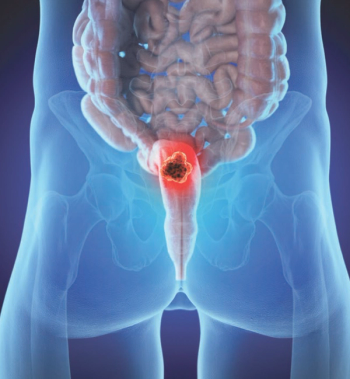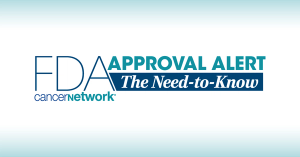
OS and PFS rates were positive as demonstrated by real-world data in patients given SBRT for oligometastatic ovarian cancer.

Your AI-Trained Oncology Knowledge Connection!


Ariana Pelosci, managing editor for CancerNetwork® and the journal ONCOLOGY®, has been with the team since June 2021. She specializes in both web and print, and runs the social media accounts for CancerNetwork®.
She graduated from the University of Delaware, where she studied Media Communications and minored in journalism and marketing. At heart, she is a Jersey girl, and you can always find her down the shore during her free time.
Ariana loves to read, specifically historical or contemporary fiction. Follow Ariana on Twitter @APelosci or email her at apelosci@mjhlifesciences.com.

OS and PFS rates were positive as demonstrated by real-world data in patients given SBRT for oligometastatic ovarian cancer.

Ifeoma Dikeocha, PhD, discussed how metabolic restriction and fasting-mimicking diets can help optimize chemotherapy outcomes in breast cancer.

Deb Schrag, MD, MPH, will assume the role as ASCO president in 2027, and hopes to continue the work of transcending global, political, and geographic barriers in oncology.

A PDUFA date in the second quarter of 2026 has been set for Dato-DXd in patients with unresectable or metastatic TNBC.

A biologics license application is planned to be sent to the FDA for OST-HER2 in recurrent, fully resected, pulmonary metastatic osteosarcoma.

IFx-2.0 showed a clinical benefit in an early phase 1 trial and has now been given orphan drug designation by the FDA for patients with stage IIB to IV cutaneous melanoma.

Results of 9 patients with metastatic breast cancer dosed with Bria-IMT have shown sustained survival.

The FDA held a Type B meeting regarding the use of d3-T, a form of testosterone, and the risk of developing breast cancer in women.

A phase 3 trial of iSCIB1+, a novel cancer vaccine, assessing patients with advanced melanoma has been cleared by the FDA.

The BC-RADS-2 study aimed to address diagnostic delays and cancer care disparities of patients with breast cancer in low- and middle-income countries.

Updated data from the 5-year analysis of KEYNOTE-942 of mRNA-4157/pembrolizumab in high-risk melanoma showed a maintained benefit.

The marketing authorization was based on results from the DESTINY-Breast09 trial assessing T-DXd/pertuzumab in first-line HER2+ metastatic breast cancer.

ACT5 of the PLAT study found radiotherapy dose escalation did not improve outcomes, safety, or QOL in patients with anal cancer.

The primary end point of ORR was met in the CAR-like T-cell arm for patients with gastric/GEJ cancer.

Results from arm A of a phase 1/2 trial showed improved efficacy with multi-antigen targeted T cells plus frontline chemotherapy.

Investigators assessed recurrence rates between axillary lymph node dissection recipients after neoadjuvant chemotherapy vs nonrecipients.

An investigational new drug application for ALA-101 has been submitted to the FDA for the treatment of CD19-positive non-Hodgkin lymphoma and leukemia.

In patients with cancer, there was an increased risk of cardiovascular death vs those who did not have cancer (HR, 2.46).

The approval of narsoplimab by the FDA may now prevent fatal complications from stem cell transplants.

VCU Massey Cancer Center is utilizing L-Dex bioimpedance spectroscopy to move toward a preventative model for lymphedema.

The approval of durvalumab plus FLOT for patients with resectable gastric/GEJ cancer cements itself as a new standard of care in the space.

Numerous clinicians spoke about breaking news, clinical trial updates, and the evolution of standard-of-care treatment throughout 2025.

Michelle Riba, MD, discusses the evolution of distress screening in oncology and the move toward a collaborative care model to integrate psychosocial support into clinical practice.

Daniel C. McFarland, DO; and Charles Kamen, PhD, MPH, discuss the unique challenges that sexual and gender minority groups experience in cancer care.

Moving the needle in cancer research was an important focus for the journal ONCOLOGY in 2025.

How John G. Phillips, MD, MPH, and Tennessee Oncology are aiming to expand radiation oncology access in smaller communities across Tennessee.

A label for imlunestrant/abemaciclib in ER+/HER2– advanced breast cancer with ESR1 mutations will be sought.

The 1-year EFS with CART19 was 90% among patients with B-ALL who had 1 or more CNS relapses.

Sunil Dutta, MD, discusses how whole-breast radiation or systemic therapy is responsible for controlling low-volume disease.

The FDA has given a PDUFA date of April 8, 2026, to the nivolumab/AVD regimen for stage III or IV classical Hodgkin lymphoma.

Published: January 24th 2025 | Updated: February 6th 2025

Published: August 10th 2021 | Updated:

Published: July 7th 2022 | Updated:

Published: July 30th 2025 | Updated:

Published: August 19th 2021 | Updated:

Published: August 21st 2021 | Updated: